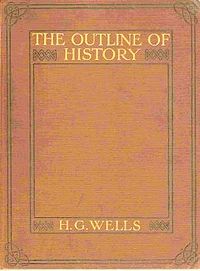- The Outline of History
-
"Outline of History" redirects here. For topic outline of history, see Outline of history.
The Outline of History 
Cover of the 1920 editionAuthor(s) H. G. Wells Illustrator J. F. Horrabin Language English Publisher George Newnes Publication date 1919 The Outline of History, subtitled either "The Whole Story of Man" or "Being a Plain History of Life and Mankind", is a book by H. G. Wells published in 1919. Wells was very dissatisfied with the quality of history textbooks at the end of World War I, and so, between 1918 and 1919, produced a 1,324-page work which was published in serial softcover form in 1919, with the first hardcover edition appearing in 1920. The book met with popular acclaim and massive sales. Nevertheless, its popularity and literary achievements were overshadowed by Wells's works of science fiction, such as The Invisible Man, The Time Machine, The Island of Dr. Moreau, and his most popular work, The War of the Worlds. Because of this, Wells is now widely known not as a non-fiction writer or a historian, but as a novelist.
Contents
Revised editions
Several revised versions were produced during Wells's lifetime, and the author kept notes on factual corrections he received from educators around the world. The last revision in his lifetime was published in 1939. In 1949, an expanded version was produced by author and scholar Raymond Postgate, whose additional material initially expanded the timeline through World War II, with subsequent additions through 1969. Postgate wrote that "readers wish to hear the views of Wells, not those of Postgate", and endeavored to preserve the original authorial voice throughout his revisions. In later editions, G. P. Wells, the author's son, updated the early chapters about prehistory to reflect current theories; previous editions, for instance, gave credence to the Piltdown Man hoax. The final edition appeared in 1971, but earlier editions are still in print.
Responses, rebuttals and objections
The Outline of History inspired responses from the serious to the parodic.
- In 1921 Algonquin Round Table member Donald Ogden Stewart first reached success with his satire, A Parody Outline of History.
- In 1925 G. K. Chesterton wrote The Everlasting Man at least partly in reaction to Wells. It disputes his portrayals of human life and civilization as a seamless development (via evolution) from animal life, of Jesus Christ as merely another charismatic leader, and of the Christian Church as one more religious movement like any other.
- In 1926 Hilaire Belloc wrote "A Companion to Mr. Wells’s "Outline of History," a devout Roman Catholic, Belloc was deeply offended by Wells’ treatment of Christianity in The Outline. Wells wrote a short book as a rebuttal called Mr. Belloc Objects to “The Outline of History.” In 1926, Belloc published his reply, Mr. Belloc Still Objects.
Allegations of plagiarism
In 1927 a Canadian citizen, Florence Deeks, sued Wells for infringement of copyright, claiming that much of the Outline was lifted from her unpublished manuscript, "The Web of the World's Romance", which spent over a year in the hands of Wells's North American publisher, Macmillan & Company. While her claim was met with ridicule from the bench and was dismissed, many errors and omissions were shared by both manuscripts. Carleton University professor A. B. McKillop published an argument for Deeks' case in 2001.[1] For his part, Wells had said the Outline was the culmination of notes and historical outlines he created in the course of writing previous works, and credited the assistance of numerous historians in preparing his manuscript.
In popular culture
- In John Huston's 1941 film The Maltese Falcon Kasper Gutman played by Sydney Greenstreet says "These are facts, historical facts, not schoolbook history, not Mr. Wells' history, but history nevertheless."[2]
- In Fredric Brown's 1949 science-fiction novel What Mad Universe, the protagonist finds himself transported to an alternate universe. Finding a copy of Wells's Outline of History, it turns out to be identical to the one he knows until 1903, at which point the alternate Wells records the invention of anti-gravity, a fast human expansion into space, a brutal war for the conquest of Mars which Wells strongly denounces, followed by a titanic conflict with Arcturus.
Notes
- ^ McKillop, A.B. The Spinster and the Prophet: H.G. Wells, Florence Deeks, and the Case of the Plagiarized Text. New York City: Four Walls Eight Windows, 2000. ISBN 1-56858-236-6
- ^ IMDb: The Maltese Falcon (1941) - Memorable quotes
External links
- Full text of the 1920 edition of The Outline of History
- PDF File of the full Outline of History
- Salon.com's review of A. B. McKillop's examination of the Deeks/Wells plagiarism case, The Spinster and the Prophet.
- A Short History Of The World, the full text of Wells's much shorter history, published in 1922.
Categories:- 1920 books
- Books about civilizations
- Books by H. G. Wells
Wikimedia Foundation. 2010.
